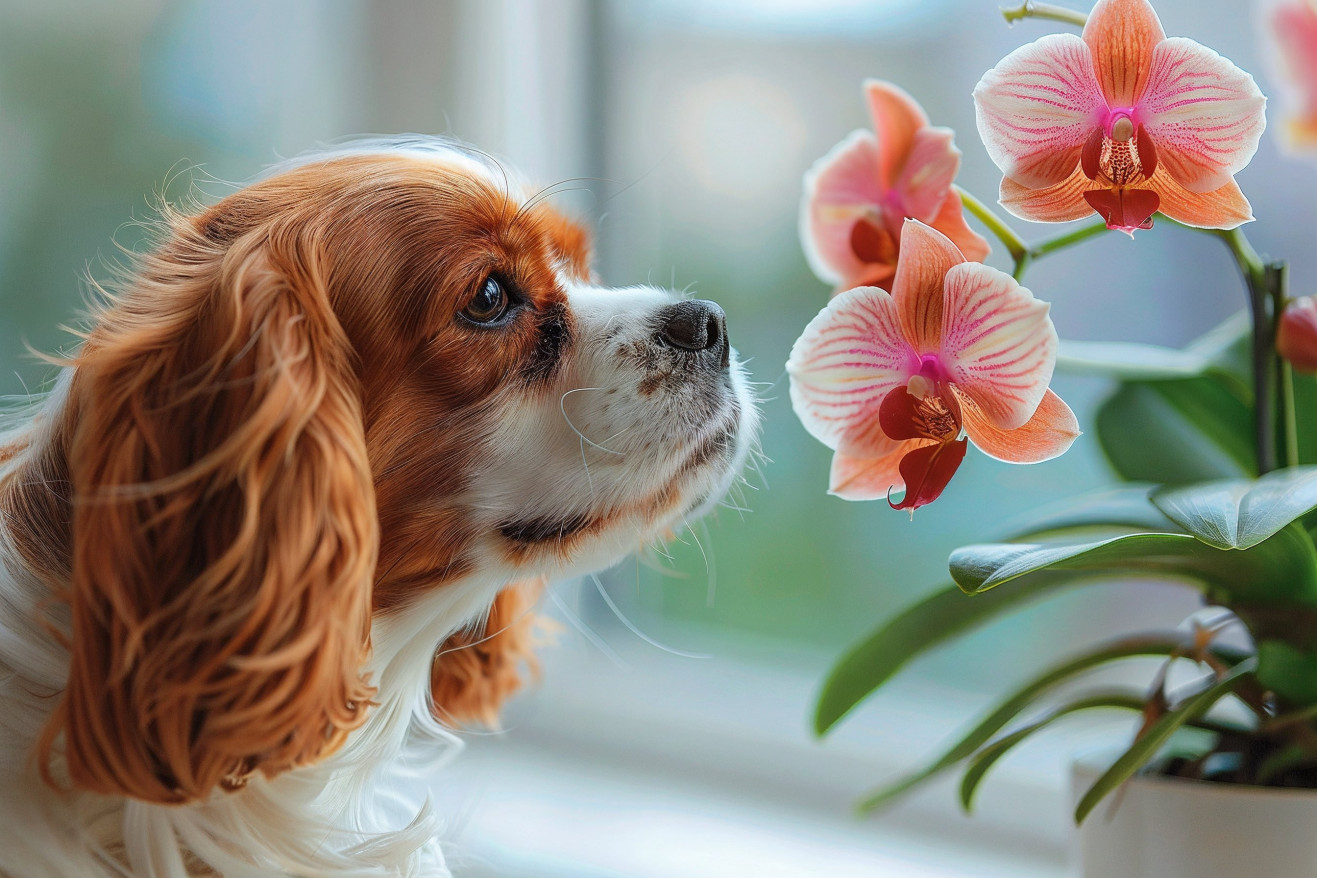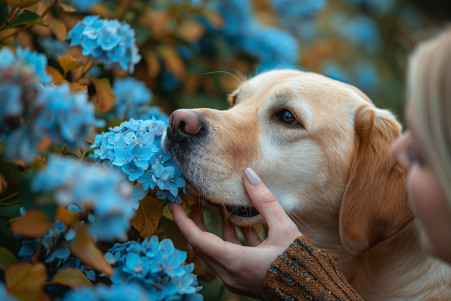Can Dogs Eat Orchids? Everything You Need to Know About Dogs and Orchids
14 March 2024 • Updated 13 March 2024

Dog parents want to make sure their pups are safe, and that includes knowing whether or not the orchids in their home are toxic to their pets. In general, orchids are not poisonous to dogs. That said, while the Phalaenopsis orchid is safe, you should still try to keep your dog from eating any part of the plant, which can lead to an upset stomach.
It’s also important to watch your dog for signs of distress after they’ve eaten an orchid.
This article will take a deep dive into botanical, veterinary, and toxicological research to provide a comprehensive look at orchids and their impact on dogs. We’ll review research to find out which types of orchids are dangerous and what happens when dogs eat them.
We’ll also cover how to keep your dog safe and provide some non-toxic alternatives to orchids so you can make sure your pets are protected. By the time you’re done reading, you’ll have all the information you need to keep your dog safe around your houseplants.
Are orchids poisonous to dogs?
Orchids and Their Impact on Dog Health
The Orchidaceae family, also known as the orchid family, is one of the largest families of flowering plants and can be found in a variety of climates, from the arctic to the tropics.
According to Hunker, one thing that many of these plants have in common is that they are not toxic to dogs, and most species of orchids, including the Phalaenopsis or Moth Orchid, are not toxic to dogs. This is supported by the ASPCA’s list, which does not include any orchids as toxic to dogs or cats.
That said, there are some exceptions that dog owners should be aware of. For example, Cypripedium orchids, which are also known as “Lady Slipper Orchids,” can cause skin irritation similar to poison ivy and can cause stomach upset if a dog ingests them, according to Love Your Dog.
In addition, the risks associated with hybrid orchids are not as well-defined. Because these plants are hybrids, they have a lot of genetic variation, and it’s possible that they could contain genes that are toxic to pets.
While orchids are unlikely to cause severe toxicity, it’s important to know the specific type of orchid you have in your home to ensure your dog’s safety. By learning to identify the few types of orchids that could be problematic and taking the appropriate precautions, pet owners can create a safe and healthy environment for their dogs.
How to Tell If Your Dog Has Eaten an Orchid
While it’s unlikely that your dog will have a severe reaction to eating an orchid, it’s important to know the signs of a potential problem. If your dog is experiencing any of the following symptoms, it may be a sign that they have eaten an orchid:
- Itchy, red skin
- Irritation in the mouth
- Drooling
- Gastrointestinal upset
These symptoms are more likely to occur if your dog has eaten a Cypripedium orchid, which is known to cause irritation. In her article for Love Your Dog, Dr. Joanna Woodnutt recommends washing the affected area and seeking veterinary care if you suspect that your dog has eaten an orchid.
According to Steve M. Ensley in the Merck Veterinary Manual, treatment for orchid poisoning may include decontamination, which could involve inducing vomiting or administering activated charcoal to absorb the toxins. In addition, supportive care will be given to help manage symptoms such as seizures, respiratory distress, or arrhythmias.
The prognosis for orchid poisoning is good, and most dogs will make a full recovery with treatment. There are no known long–term effects of orchid poisoning, but it’s important to monitor your dog for any unusual or prolonged symptoms. By being vigilant and seeking treatment if you suspect that your dog has eaten an orchid, you can help ensure that they make a full recovery.
Creating a Safe Space: How to Keep Your Dog and Your Orchids Safe
Keeping your home a safe space for both your plants and your pets will require a few different measures. First, make sure that your home is pet-proofed, and that your orchids and other plants are in a place where your dog can’t get to them, whether that’s in a room that your pet can’t access or on a high shelf.
The Spruce suggests that hanging baskets and plant stands can be a great way to keep your dog away from your plants.
You can also use training methods to help your dog avoid your plants. Make sure that your dog is getting enough exercise and mental stimulation, and that you’re addressing any anxiety that they may be experiencing.
A dog that is well-exercised and mentally stimulated is less likely to get into things they shouldn’t, and that includes your plants. If anxiety is the issue, The Spruce recommends working with a certified canine behaviorist to find a solution that will work for your dog.
In addition, make sure that you’re aware of the products that you’re using on your plants.
Opting for organic, pet-friendly fertilizers, such as fish emulsion, can help ensure that your dog won’t be harmed if they do decide to take a bite.
It’s also important to make sure that you’re keeping an eye on your pets and watching for signs of distress. Catching a problem early can help ensure that a small issue doesn’t become a big one.
By taking these steps, you can make sure that you’re keeping your love of plants and your love for your dog in balance.
How to Create a Dog-Safe Indoor Garden
For dog owners who want to bring plants into their home but don’t want to put their pets at risk, there are many non-toxic houseplants to choose from.
In addition to the 11 pet-friendly plants that the ASPCA recommends, the American Rubber Plant, Spider Plant, and Boston Fern are also on the list.
Not only are these plants safe for pets, but they also have a range of care needs, so you can find one that works for you and your lifestyle. For example, the low-maintenance Spider Plant is also a great air purifier, so it’s a great option for any room.
Bloombox Club also notes that pet-safe plants like the Calathea are great air purifiers and have beautiful fishbone-style markings. Meanwhile, the Chinese Money Plant is easy to care for and has the added bonus of being able to produce baby plants. Bringing these pet-friendly plants into your home can help you improve air quality and add beauty to your space, which can help you create a healthier, happier home.
Before bringing any new plants into your home, make sure to check the ASPCA list of non-toxic plants to make sure that you’re creating a safe environment for your dog. With the right plants, you can create an indoor garden that benefits everyone in your family, including your furry friends.
Orchids: A Way to Improve Your Home and Your Pet’s Air Quality
While there is still much to learn about the relationship between orchids and air quality, one area of scientific research that has been explored is the use of indoor orchids to improve the air quality of humans and pets.
A systematic review published on PubMed found that indoor plants can help reduce the levels of common indoor pollutants like formaldehyde, benzene, and toluene. As a result, using orchids as part of your home decor can help improve the air quality for you and your pets.
This is further supported by a study published on PMC that looked at plant-based interventions like phytoremediation and how they can improve indoor air quality by reducing temperatures and pollutants. For pet parents, this means that orchids can help improve the air quality of their home while also helping to protect their pets from respiratory issues.
Although there may be some misconceptions about the impact of plants on indoor air quality, the truth is that non-toxic and air-purifying orchids can help create a well-rounded and healthy living environment. They bring together beauty and health, and that makes them a great option for pet parents who want to create a home that is both safe and beautiful.
Final Thoughts: Orchids and Orchids in a Dog-Friendly Home
From our discussion of orchids and their impact on dogs, it’s clear that the vast majority of orchids, including the popular Phalaenopsis orchid, are not harmful to dogs. We’ve looked at how rare orchid toxicity is, discussed the ASPCA’s listing of orchids as non-toxic, and emphasized the importance of knowing the few exceptions to this rule.
In conclusion, we want to remind pet parents to always be on the lookout for and informed about potential plant toxicities. It’s important to know the symptoms of poisoning, what to do if you suspect your pet has ingested a toxic plant, and how to prevent exposure in the first place.
By choosing the right plants and making sure they’re safe, you can create a healthy, pet-friendly environment that allows you to enjoy the beauty of the outdoors inside without worrying about your pets’ well-being.
Hopefully, this article will help you remember that it is possible for your decorative plants and beloved pets to coexist in your home. The happiness and peace they bring to your life are invaluable, and with the right information and precautions, you can continue to enjoy both in your home.


